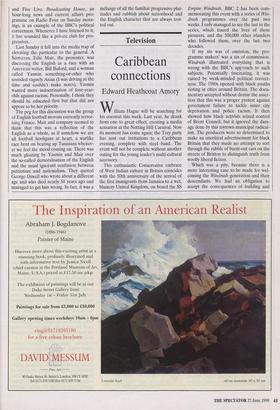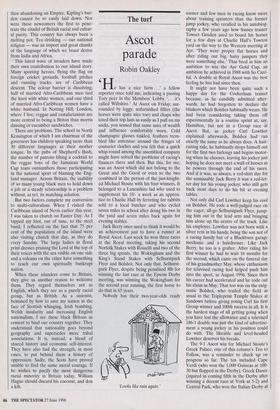Television
Caribbean connections
Edward Heathcoat Amory
It Hague will be searching for his coconut this week. Last year, he drank from one to great effect, creating a media sensation at the Notting Hill Carnival. Now its moment has come again; the Tory party has sent out invitations to a Caribbean evening, complete with steel band. The event will not be complete without another outing for the young leader's multi-cultural accessory.
This enthusiastic Conservative embrace of West Indian culture in Britain coincides with the 50th anniversary of the arrival of the first immigrants from Jamaica to a wet, blustery United Kingdom, on board the SS Empire Windrush. BBC 2 has been com- memorating this event with a series of Win- drush programmes over the past two weeks. I only managed to see the last in the series, which traced the lives of those pioneers, and the 500,000 other islanders who followed them, over the last two decades.
If my sin was of omission, the pro- gramme makers' was a sin of commission. Windrush illustrated everything that is wrong with the BBC's approach to such subjects. Potentially fascinating, it was ruined by weak-minded political correct- ness. The 1980s opened with black youths rioting in cities around Britain. The docu- mentary accepted without demur the asser- tion that this was a proper protest against government failure to tackle inner city deprivation and police racism. It then showed how black activists seized control of Brent Council, but it ignored the dam- age done by this toytown municipal radical- ism. The producers were so determined to make an uncritical advertisement for black Britain that they made no attempt to sort through the rubble of burnt-out cars on the streets of Brixton to distinguish truth from woolly liberal fiction.
Which was a pity, because there is a more interesting case to be made for wel- coming the Windrush generation. and their descendants. We had an obligation to accept the consequences of building and then abandoning an Empire. Kipling's bur- den cannot be so easily laid down. Nor were these newcomers the first to pene- trate the citadel of British racial and cultur- al purity. This country has always been a melting pot. Tea drinking — our national religion — was an import and great chunks of the language of which we boast derive from India and Africa.
This latest wave of invaders have made their own contribution to our island story. Many sporting heroes, flying the flag on foreign cricket grounds, football pitches and running tracks, are of Caribbean descent. The colour barrier is dissolving; half of married Afro-Caribbean men tied the knot with white women, and one third of married Afro-Caribbean women have a white husband. In Notting Hill, London, where I live, reggae and rastafarianism are more central to being a Briton than morris dancing or cucumber sandwiches.
There are problems. The school in North Kensington of which I am chairman of the governors has children speaking more than 30 different languages as their mother tongue. In the pubs of Shepherd's Bush, the number of patrons lifting a cocktail to the reggae boys of the Jamaican World Cup team outnumbers those participating in the national sport of blaming the Eng- land manager. Across Britain, the inability of so many young black men to hold down a job or a steady relationship is a problem without, as yet, its matching solution.
But two factors complete my conversion to multi-culturalism. When I visited the Caribbean island of Nevis earlier this year, I was taken to church on Easter Day. As I tapped my foot, out of tune, to the steel band, I reflected on the fact that 75 per cent of the population of the island were also visiting church that day, as they do every Sunday. The large ladies in floral print dresses praising the Lord at the top of their voices with the sea visible on one side and a volcano on the other have something to teach our own spiritually bankrupt nation.
When these islanders come to Britain, they give us another reason to welcome them. They regard themselves not as English, which they see as a purely racial group, but as British. As a unionist, bemused by how to save my nation in the face of Scottish whinging, Irish bombing, Welsh insularity and increasing English nationalism, I see these black Britons as cement to bind our country together. They understand that nationality goes beyond geography and supersedes mere tribal associations. It is, instead, a blend of shared history and economic self-interest. They have also had the strength, in most cases, to put behind them a history of oppression. Sadly, the Scots have proved unable to find the same moral courage. If he wishes to pacify the most dangerous racial minority in Britain today, William Hague should discard his coconut, and don a kilt.



























































 Previous page
Previous page